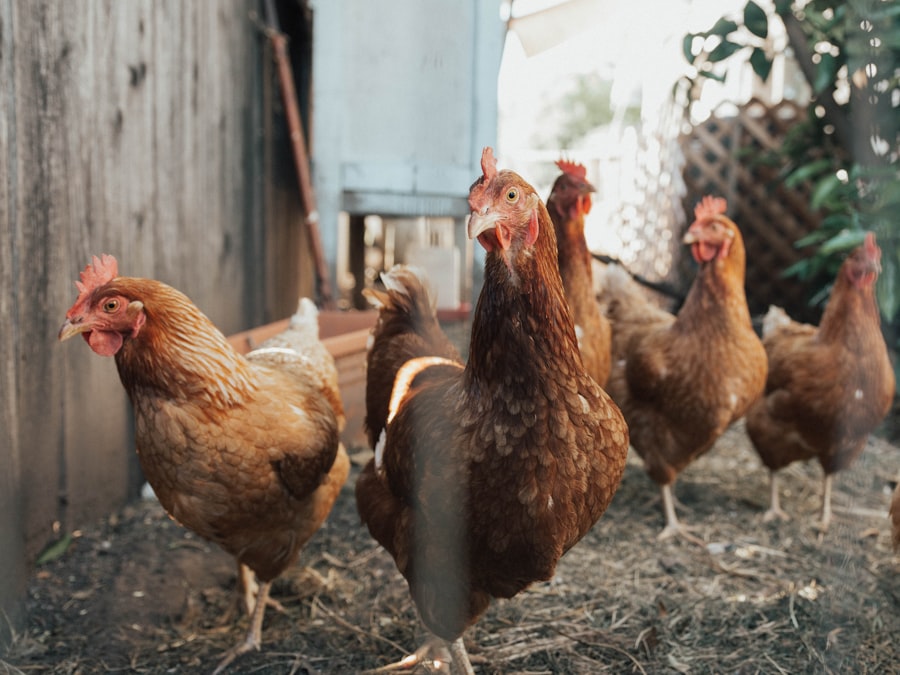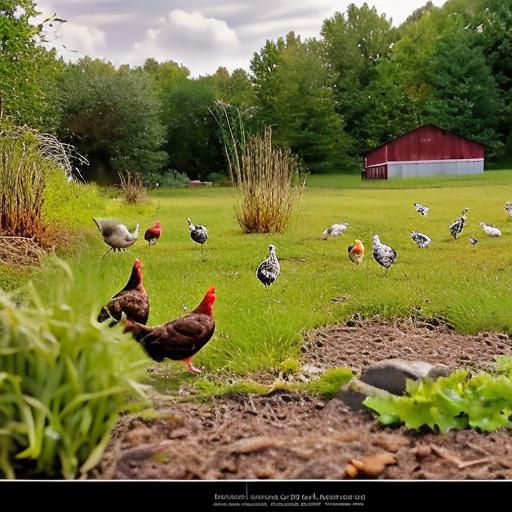Raising free range chickens in your backyard has become a popular trend in recent years. Not only does it provide a sustainable source of fresh eggs and meat, but it also offers numerous benefits for both the chickens and the environment. In this article, we will explore the advantages of raising free range chickens, discuss how to choose the right breed, provide tips on preparing the chicken coop, and offer advice on feeding and watering your chickens. We will also cover topics such as protecting your chickens from predators, maintaining the chicken coop and yard, harvesting eggs and meat, troubleshooting common issues, and more.
Key Takeaways
- Raising free range chickens has numerous benefits, including healthier and tastier eggs and meat, reduced environmental impact, and increased self-sufficiency.
- When choosing a breed of chicken, consider factors such as temperament, egg-laying ability, and climate adaptability.
- A well-prepared chicken coop should provide shelter, ventilation, and nesting boxes, and should be cleaned regularly to prevent disease.
- Free range chickens require at least 4 square feet of outdoor space per bird, with access to grass, shade, and dust baths.
- Feeding and watering free range chickens requires a balanced diet of grains, protein, and fresh water, with supplements such as oyster shells and grit. Predators can be deterred with fencing, netting, and guard animals. Regular maintenance of the coop and yard is essential for the health and safety of the chickens.
Benefits of raising free range chickens
Consuming free range chicken eggs and meat has several health benefits. Free range chickens have access to a natural diet that includes insects, worms, and grass, which results in eggs and meat that are higher in omega-3 fatty acids and vitamins A and E compared to conventionally raised chickens. Additionally, free range eggs have been found to have lower levels of cholesterol and saturated fat. By raising your own free range chickens, you can ensure that you are consuming high-quality, nutritious food.
Raising chickens can also be a fun and rewarding hobby. Chickens are social animals that can provide companionship and entertainment. They have unique personalities and behaviors that can be fascinating to observe. Taking care of chickens can also teach children about responsibility and the importance of caring for animals. Furthermore, raising free range chickens allows you to connect with nature and experience the joy of self-sufficiency.
In addition to the health benefits and personal enjoyment, raising free range chickens is also beneficial for the environment. Free range chickens have a lower carbon footprint compared to conventionally raised chickens because they have access to outdoor space where they can forage for food. They also help control pests in your yard by eating insects and other small creatures. Furthermore, raising your own chickens reduces your reliance on factory-farmed eggs and meat, which are often produced in environmentally unsustainable ways.
Choosing the right breed of chickens
When it comes to choosing the right breed of chickens, there are several factors to consider. Different breeds have different characteristics in terms of size, temperament, egg production, and meat quality. Some popular breeds for backyard chickens include Rhode Island Reds, Sussex, Plymouth Rocks, and Leghorns.
If you are primarily interested in egg production, breeds such as Leghorns and Rhode Island Reds are known for their high egg-laying capabilities. On the other hand, if you are more interested in meat production, breeds such as Cornish Cross or Freedom Rangers may be more suitable. It is important to research the specific characteristics of each breed to determine which one best suits your needs and preferences.
When selecting chicks, it is crucial to choose healthy chicks from a reputable source. Look for chicks that are active, alert, and have clean feathers. Avoid chicks that appear weak or have any signs of illness or injury. Purchasing chicks from a reputable hatchery or local breeder can help ensure that you are starting with healthy stock.
Preparing the chicken coop
Before bringing your chickens home, it is important to prepare a suitable chicken coop. The coop should provide a safe and comfortable environment for your chickens to live in. When choosing a location for your chicken coop, consider factors such as sunlight exposure, drainage, and proximity to your house.
The materials and tools needed to build a chicken coop will depend on your budget and personal preferences. Common materials include wood, wire mesh, and roofing materials. The coop should be well-ventilated to prevent the buildup of ammonia from chicken waste. Insulation can also be added to regulate temperature extremes.
Providing adequate space for free range chickens
Free range chickens require adequate space to roam and forage. The recommended amount of space per chicken varies depending on the breed and the size of the chickens. As a general guideline, each chicken should have at least 4 square feet of indoor space and 10 square feet of outdoor space.
Creating a safe and secure outdoor space for your chickens is essential to protect them from predators. This can be achieved by installing a sturdy fence or using chicken wire to enclose the area. It is also important to provide shade and shelter from the elements, such as trees or a covered area within the outdoor space.
Feeding and watering free range chickens

Free range chickens have access to a natural diet that includes insects, worms, grass, and other vegetation. However, it is still important to provide them with a balanced diet to ensure their health and productivity. There are different types of feed available for chickens, including pellets, crumbles, and mash. It is important to choose a feed that is appropriate for the age and breed of your chickens.
In addition to feed, chickens also require clean and fresh water. Water should be provided in a clean container that is easily accessible to the chickens. It is important to regularly clean and refill the water container to prevent the growth of bacteria.
Chickens also require grit and calcium supplements for proper digestion and eggshell formation. Grit helps chickens grind their food in their gizzard, while calcium supplements help strengthen eggshells. Grit can be provided by offering crushed oyster shells or small stones, while calcium supplements can be provided in the form of crushed eggshells or commercially available supplements.
Protecting free range chickens from predators
Predators such as raccoons, foxes, snakes, and birds of prey can pose a threat to free range chickens. It is important to secure your chicken coop and outdoor space to prevent predators from gaining access. This can be achieved by using sturdy fencing, burying wire mesh underground to prevent digging, and covering the coop with wire mesh or netting.
Regular monitoring of your chickens is also important to ensure their safety. Look for signs of illness or injury, such as lethargy, loss of appetite, abnormal droppings, or feather loss. If you notice any signs of distress, it is important to take immediate action to prevent further harm to your chickens.
Maintaining the chicken coop and yard
Keeping the chicken coop and yard clean and tidy is essential for the health and well-being of your chickens. Regular cleaning helps prevent the buildup of bacteria and parasites. Remove any wet bedding or droppings from the coop and replace it with fresh bedding. It is also important to regularly clean and disinfect water containers and feeders.
Chicken waste can be composted and used as fertilizer for your garden. However, it is important to properly dispose of chicken waste to prevent the spread of disease. Avoid using chicken waste as fertilizer for edible crops, as it may contain harmful bacteria.
Regular maintenance and repairs are also important to ensure the longevity of your chicken coop. Check for any signs of damage or wear and tear, such as loose boards or holes in the fencing. Repair any issues promptly to prevent predators from gaining access to your chickens.
Harvesting eggs and meat from free range chickens
Harvesting eggs and meat from your free range chickens can be a rewarding experience. When harvesting eggs, it is important to collect them daily to prevent them from becoming dirty or damaged. Store eggs in a cool place, such as a refrigerator, with the pointed end facing downwards.
When harvesting meat, it is important to follow proper food safety guidelines. Ensure that the chicken is properly slaughtered and cleaned before processing. Store meat in a refrigerator or freezer at the appropriate temperature to prevent spoilage.
Troubleshooting common issues with free range chickens
Chickens can be susceptible to various health issues, including respiratory infections, parasites, and injuries. It is important to be familiar with common health issues and know how to identify and treat them. Common signs of illness or injury include lethargy, loss of appetite, abnormal droppings, coughing, sneezing, or lameness.
If you notice any signs of illness or injury, it is important to take immediate action. Isolate the affected chicken from the rest of the flock to prevent the spread of disease. Consult with a veterinarian if necessary for a proper diagnosis and treatment plan.
Raising free range chickens in your backyard offers numerous benefits, including access to fresh and nutritious eggs and meat, a fun and rewarding hobby, and positive environmental impact. By choosing the right breed, preparing a suitable chicken coop, providing adequate space, feeding and watering properly, protecting from predators, maintaining cleanliness, and following proper harvesting practices, you can successfully raise free range chickens. If you are considering raising chickens in your backyard, be sure to do further research and consult with local experts or resources for more information.
If you’re interested in keeping free range chickens in your yard, you’ll definitely want to check out this informative article on the Poultry Wizard website. They have a wide range of articles dedicated to poultry care and one that caught my attention is about the Producers Pride Sentinel Chicken Coop. This coop is designed specifically for free range chickens and provides a safe and comfortable environment for them to roam. It’s a great resource for anyone looking to create a suitable space for their feathered friends. Additionally, if you’re wondering how many chickens you need for a family of four, Poultry Wizard has an article that answers that question too. And if you’re feeling adventurous, they even have an article on creating a chicken coop trampoline! So, whether you’re a beginner or an experienced chicken keeper, Poultry Wizard has all the information you need to keep your free range chickens happy and healthy.
FAQs
What are free range chickens?
Free range chickens are chickens that are allowed to roam freely in a designated area, rather than being confined to a small space or cage.
What are the benefits of keeping free range chickens?
Keeping free range chickens can provide a source of fresh eggs, natural pest control, and fertilizer for your yard or garden. Additionally, free range chickens tend to be healthier and happier than chickens kept in confinement.
What do free range chickens need to thrive?
Free range chickens need access to fresh water, shelter from the elements, and a balanced diet that includes grains, vegetables, and protein. They also need protection from predators, such as foxes, raccoons, and hawks.
How much space do free range chickens need?
Free range chickens need at least 4 square feet of space per bird in their designated area. However, more space is always better, as it allows the chickens to move around freely and engage in natural behaviors.
What are some common predators of free range chickens?
Common predators of free range chickens include foxes, raccoons, hawks, owls, and snakes. It is important to take measures to protect your chickens from these predators, such as installing fencing and providing secure shelter.
What are some tips for keeping free range chickens in your yard?
Some tips for keeping free range chickens in your yard include providing plenty of space, ensuring access to fresh water and a balanced diet, protecting them from predators, and regularly cleaning their living area. It is also important to check local regulations and obtain any necessary permits before keeping chickens in your yard.
Meet Walter, the feathered-friend fanatic of Florida! Nestled in the sunshine state, Walter struts through life with his feathered companions, clucking his way to happiness. With a coop that’s fancier than a five-star hotel, he’s the Don Juan of the chicken world. When he’s not teaching his hens to do the cha-cha, you’ll find him in a heated debate with his prized rooster, Sir Clucks-a-Lot. Walter’s poultry passion is no yolk; he’s the sunny-side-up guy you never knew you needed in your flock of friends!







